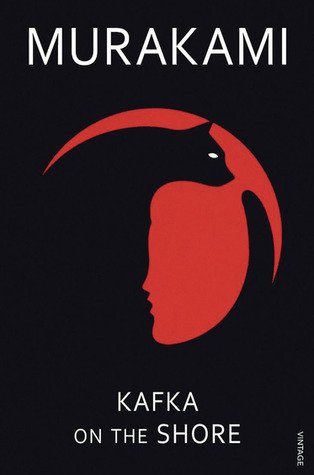At the New Yorker Festival with Haruki Murakami
[Originally published for the Chapter-Indigo fiction blog]
In early autumn every [non-pandemic] year The New Yorker Festival is held in venues across and along the island of Manhattan, gathering some of, if not the, world’s best artists to discuss, to perform, to share. When you're very favourite living author crosses the ocean and finally gives a talk you can fly out to, you fly, you fly.
There was a small table with a pitcher of water and two glasses on the stage, two chairs on either side of the table. The talk’s moderator, New Yorker Fiction Editor Deborah Treisman, sat on the one side. Haruki Murakami, his legs crossed, sat on the other. He was wearing a creamy beige suit over a white t-shirt so washed-out the Tide laundry detergent brand in the dead centre of his chest was almost as white as the T-shirt. His shoes, like a narrator from one of his novels, were very faded red sneakers.
His hands were in his lap and he spent much of the afternoon’s talk looking down at them. When he looked up, to punctuate a point, say, you saw the full colour in his cheeks. He is in his late fifties, but all his marathon running and highly, highly disciplined life show in his glow. He looks healthy, happy – content might be the more appropriate word.
You can’t fake humility. You can think you can, but you can’t, and Murakami was not faking it, despite his being touted to win the Nobel Prize in the near future. It’s not that Japan’s most famous, most successful author is so daft as to not realize how big a literary celebrity he is. It seems more that he has the wherewithal to not take himself or his status so seriously as to allow that to be a central issue of his life.
This is a rather remarkable position to take considering the extent to which Murakami is a literary sensation.Norwegian Wood, his sixth novel, is the best selling novel of all time in Japan. His latest 1Q84 , to be released next month in North America, sold out of its first printing on its first day of release back in his home country. The book went on to sell a million copies. In its first month! But again, that’s in Japan. Okay so he is also massively famous in Korea and much of the rest of Asia, and the Israelis are big fans. They love him in Western Europe and probably Eastern Europe too. But what of the Americas?
The Murakami event at the New Yorker Festival four years ago sold out in eleven minutes. Eleven minutes! This was not Mick Jagger cat-prancing across a stage with a many thousand dollar light show for background we’re talking about. Nor was it a Lady Madonna (ahem Gaga) concert either. There’d be no wild costumes. There would be nary a strobe light in sight. We’re talking about a novelist from Japan coming to sit on a stage and talk about his work. Did I mention that the talk sold out in eleven minutes?
Murakami outlined three key elements he tries to imbue in his fiction:
reason
free improvisation
harmony
To know the man's writing is to know that his reason is everywhere evident in the calm and logical manner in which his protagonists investigate the increasingly unreal elements that surround them. The free improvisation makes sense when considering the weird and wacky directions his stories can go, not to mention Murakami's great love of jazz, that most improvisational of music styles. It is harmony, though, that resonated most, for not only is this a writer who can balance pathos with humor, or the surreal with the seemingly mundane in his fiction, but he seems to manifest harmony in his very physical presence. To see the way he sits, the way he takes his time to think over a question. Haruki Murakami does not rush to speak. This is not a person who babbles.
This is rather a guy (‘guy’ because he comes across so casual, so chummy, so ho-hum) who drinks little, is early to bed and incredibly early (as early as 3am) to rise. To describe him as a hard worker would be a laughably gross understatement. In a career spanning just over 30 years, his staggering output is awe-inspiring to say the least. Murakami is best known overseas for his twelve novels, and for a few collections of short stories. In Japan he is legendary for these, but also for his non-fiction, for multiple collections of essays, never mind the quantity of prose he’s translated from English to Japanese in his spare time, including works by F. Scott Fitzgerald, Raymond Carver, Raymond Chandler and J.D. Salinger, to name but a few. What to most writers would be a jaw-droppingly successful career in one writing arena, seems but a hobby to Murakami, who had previously said in interviews that he does his translation work in his “spare time.”
Up there on that stage in midtown Manhattan he called it fun. Or, rather, fun! was the delightfully childlike way he said it. He in fact described all of his working endeavours that way: translating, fiction writing, revising. It was all ... fun! Fun quite possibly being the most oft-repeated word out of the writer’s mouth all afternoon.
Asking a question at the talk’s end, an audience member made the astute observation that reading Murakami is a calming experience. This might but exactly explain why reading Murakami for so many – ie. millions around the world – is such an enjoyable experience. It’s why his fans don’t read one or two of his books but make their way through his great oeuvre. This is not to suggest that books like The Wind Up Bird Chronicle, Norwegian Wood or Kafka on the Shore are without their darkness. All three most certainly delve deeply down the dark well, to use a favourite Murakami metaphor. Yet even in the digging there remains a kind of serenity.
The more you watch a particular actor or read a favourite author the more you start to see how much of the person is evident in the works they present be it on page or screen, and it was no surprise that in person, Murakami, the man – the guy – so embodied a spiritual calm it all but changed the way we audience members breathed for a couple hours of a Sunday afternoon (I don’t even think I’m exaggerating).



